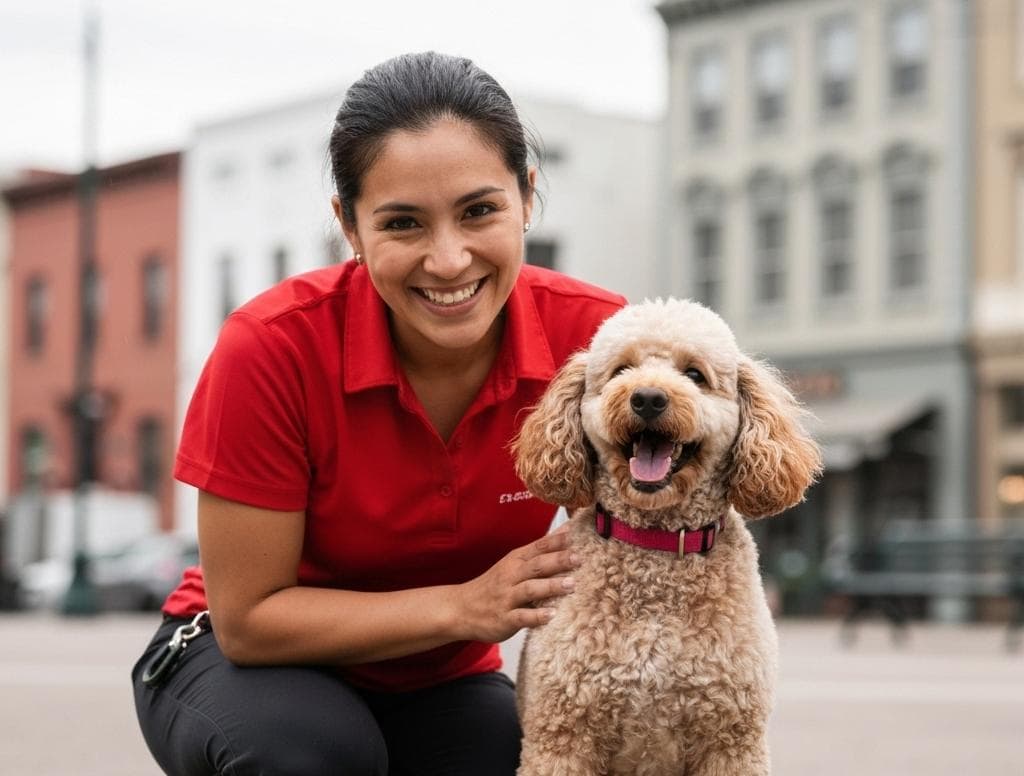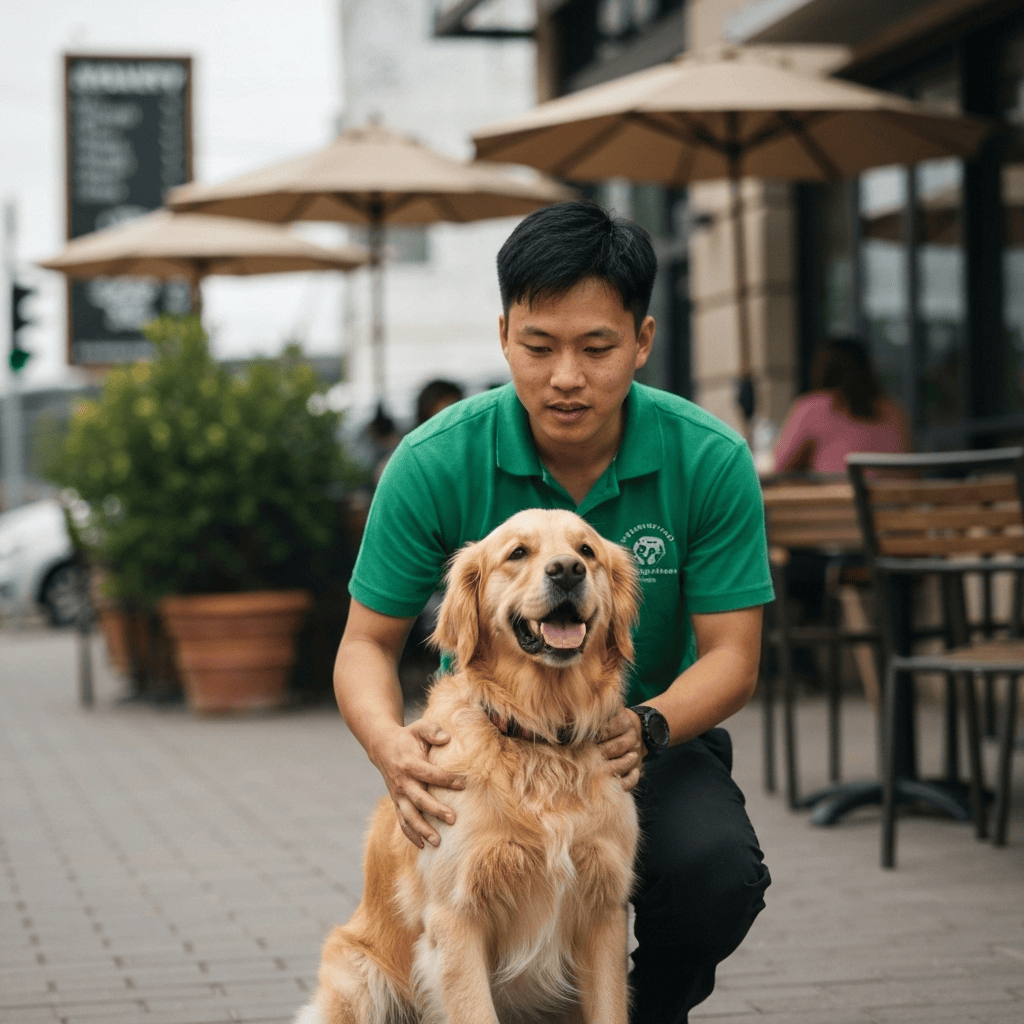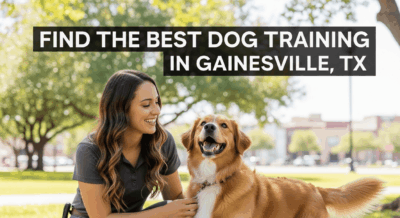Your Complete Guide to Choosing a Dog Trainer in Gainesville
If you live in Gainesville with a dog, you know how this town works. One minute you’re walking the quiet streets near the courthouse, and the next you’re at the farmers market where your pup needs to navigate crowds, kids, and other dogs. Finding the right trainer means finding someone who gets this reality.
Most dog owners here aren’t looking for perfect competition heeling. They want a dog who walks nicely to the courthouse square, doesn’t pull toward every person at Depot Days, and comes when called at the lake. The right trainer will help you build these everyday skills without turning training into a stressful chore.
How to Choose the Right Trainer
The best trainers start by listening to your actual life. Maybe your dog is great at home but loses their mind when they see another dog on California Street. Or your puppy is sweet but hasn’t figured out that jumping on your neighbor isn’t how we say hello in Texas.
Look for someone who uses positive reinforcement as their main approach. These trainers teach your dog what you want them to do, then make it worth their while to keep doing it. You’ll see better results and build a stronger relationship with your dog than you would with old-school methods that rely on corrections and intimidation.
Check their credentials too. Good trainers often hold certifications like KPA-CTP, CPDT-KA, CTC, CBCC-KA, or IAABC-CDBC. If these letters look like alphabet soup, check out this guide to dog trainer certifications to understand what they mean.
When you’re considering in-home training, ask if they travel to your part of Cooke County and what kind of homework you’ll have between sessions. For group classes, find out how they handle the inevitable chaos when six dogs are learning to sit-stay in the same room.
Common Dog Training Methods Explained

Not all training methods are created equal. Here’s what actually works for most dogs and families.
Positive reinforcement training rewards the behavior you want to see more of. Your dog learns that good things happen when they make good choices. It’s not about being permissive – it’s about being smart. When your dog figures out that sitting gets them attention faster than jumping, they’ll choose to sit.
Behavior modification tackles the bigger challenges like fear, anxiety, and reactivity. If your dog barks and lunges at other dogs or hides when strangers come over, this approach slowly changes how they feel about those triggers. You can’t just train a scared dog to “be brave,” but you can help them build confidence step by step.
Puppy classes focus on socialization during those critical first few months. Your puppy needs to meet different types of people, experience various sounds and surfaces, and learn that other dogs can be friends, not threats. Plus, you’ll work on house training, bite inhibition, and basic manners.
Obedience training covers the foundation skills every dog needs: sit, down, stay, come, and walking nicely on leash. These aren’t just party tricks. They’re life skills that keep your dog safe and make them welcome everywhere you go together.
Day training or board and train programs can help when you need faster progress or have a complicated situation. Just remember that the real work happens when your dog comes home. If you can’t maintain what the trainer taught them, the benefits won’t last.
Stay away from trainers who rely on harsh corrections, shock collars, or intimidation tactics. These methods might suppress unwanted behavior in the short term, but they often create new problems like fear and anxiety.
Average Cost of Dog Training in Gainesville TX (Updated for 2025)
Training costs in Gainesville are typically more reasonable than what you’d find in Dallas or Houston, but prices vary based on the trainer’s experience and what type of program you choose.
| Service Type | Typical Gainesville Area Average | Notes |
|---|---|---|
| Group classes 4–6 weeks | $150 – $275 | Puppy classes and basic obedience |
| Private lessons 60–90 min | $90 – $160 per session | In-home may include travel fee |
| Day training per week | $400 – $800 | Trainer works the dog, owner coaching included |
| Board and train 2–4 weeks | $1,600 – $3,400 total | Ask about daily structure and owner transfer sessions |
| Initial behavior consult | $120 – $220 | For reactivity, fear, or aggression |
| Service or therapy dog foundations | $120 – $180 per session | Often longer timelines and vet coordination |
Most trainers offer discounts when you book multiple sessions upfront. Ask for everything in writing, including what happens if you need to cancel or reschedule. If you live out in the county, there might be a small travel fee for in-home sessions.
Gainesville, Cooke County, and Texas Rules That Affect Training
You don’t need to become a legal expert, but knowing a few local rules helps you plan your training approach.
Gainesville has leash laws like most Texas towns. Your dog needs to be on leash in public spaces unless you’re in a designated off-leash area. This makes leash training essential, not optional. Check the City of Gainesville website for current ordinances.
Excessive barking can get you in trouble with neighbors and city officials. If your dog is a chronic barker, work on this early. Usually it’s about boredom, anxiety, or lack of structure rather than your dog being “bad.”
Texas requires rabies vaccination for all dogs. Keep your paperwork current – you’ll need it for training classes and boarding facilities. The Texas DSHS website has the most current vaccine requirements.
The state doesn’t license dog trainers, so you’ll need to do your homework when choosing one. Check with Cooke County or the city about pet registration requirements.
If your trainer wants to use local parks for lessons, that’s usually fine as long as you follow posted rules. Commercial trainers should check with the city about any permit requirements through the City of Gainesville.
Insurance and Business Basics
Since Texas doesn’t require trainer licenses, it’s up to you to verify credentials and professionalism. Responsible trainers carry general liability insurance and will show you proof if you ask. If they board dogs or use public facilities, they should have additional coverage.
Don’t be shy about asking for a certificate of insurance. Professional trainers expect this question and have their paperwork ready.
Questions to Ask a Potential Dog Trainer
Here’s what to find out before you commit to working with someone:
- What training methods do you use, and why do you prefer them over other approaches?
- What certifications do you hold, such as KPA-CTP, CPDT-KA, or CBCC-KA?
- Can you walk me through what my training program would look like over the first month?
- Do you offer in-home sessions, group classes, or day training, and which would work best for my situation?
- How do you handle dogs with reactivity, separation anxiety, or fear issues?
- How will we track my dog’s progress, and what kind of practice will I need to do between sessions?
- What exactly is included in your training packages, and are there any additional fees I should know about?
- Do you carry liability insurance, and can you provide proof?
- If my dog needs behavior medication or has health issues, how do you work with veterinarians?
Local Gainesville Resources for Dog Owners and Surrounding Areas
These spots give you great places to practice what you’re learning in training. Remember that off-leash areas are limited around Gainesville, so plan on doing most of your work on leash or with a long training line.
The City of Gainesville website has information about local parks and any updates to pet policies. Cooke County is your resource for county-level services and regulations.
For longer training walks with natural distractions, try Ray Roberts Lake State Park or Eisenhower State Park. Both are great for working on focus around wildlife, other dogs, and trail traffic.
Keep up with rabies requirements and other health guidelines through Texas DSHS Rabies.
If you need fenced areas for off-leash recall practice, you might need to drive to dog parks in larger nearby towns. Always check their rules and hours before making the trip.

Common Questions
How much does in-home dog training cost?
Around Gainesville, expect to pay $90 to $160 for each 60–90 minute session. If you live further out in the county, there might be a small travel fee on top of that.
Is in-home dog training worth it?
Yes, especially when you’re working on problems that happen at home. House training, door manners, and teaching your dog not to counter surf all work better when you practice in your actual kitchen and living room.
Can you pay someone to house train your dog?
A trainer can set up systems and teach you the right routine, but potty training only works with consistency between sessions. You can’t outsource the day-to-day part, but professional help makes the process much faster and less frustrating.
What is the 3-3-3 rule for dog training?
This guideline suggests new dogs need about 3 days to decompress from stress, 3 weeks to start learning your routine, and 3 months to truly settle into your family. Smart training programs work with this timeline instead of expecting too much too soon.
How long will it take to reach my training goals?
Basic manners like sit, stay, and loose-leash walking usually take 4–8 weeks with daily practice. More complex issues like reactivity or separation anxiety often need several months of careful work.
What should I bring to group classes?
Pack a regular collar or harness (not a retractable leash), plenty of small, soft treats, water for your dog, and vaccination records if the trainer requires them. Leave the squeaky toys at home unless your trainer specifically asks for them.
What’s the leash law in Gainesville?
Dogs need to be leashed in public areas unless you’re in a designated off-leash zone. Check the City of Gainesville website for the most current information.
Do I need a dog license in Gainesville or Cooke County?
Texas doesn’t require a statewide license, but local requirements can vary. Keep your rabies vaccination current and contact the city about any registration or ID requirements.
What shots does my dog need in Cooke County or Texas?
Rabies vaccination is required by state law. Your veterinarian will recommend other vaccines based on your dog’s lifestyle and risk factors. Check Texas DSHS for official rabies requirements.
Are dog trainers required to be licensed in Gainesville or Cooke County or Texas?
No, Texas doesn’t license dog trainers. That’s why it’s important to check credentials like CPDT-KSA or IAABC-CDBC and ask for proof of insurance.
Where can I practice off-leash recall?
Gainesville doesn’t have a city-run dog park yet. Many local dog owners use fenced dog parks in nearby communities or practice recall on a long line at regular parks until their dog’s recall is completely reliable.
Which dog parks allow training around Gainesville?
Dog parks in neighboring towns typically allow normal training activities like recall and greeting manners as long as you follow posted rules. Visit during quieter times, keep sessions brief, and always prioritize safety around gates and water areas.
What beaches/trails allow dogs for training?
We don’t have beaches here, but the trails at Ray Roberts Lake State Park and Eisenhower State Park welcome leashed dogs. These spots are perfect for working on loose-leash walking around distractions like cyclists, fishermen, and wildlife.
Finding the right trainer comes down to matching their approach with your goals and your dog’s personality. Focus on trainers who use humane methods, can explain their plans clearly, and understand that your dog needs to succeed in real Gainesville situations, not just in training class. If you want to understand more about what different credentials mean, this guide to dog trainer certifications can help you compare your options.
